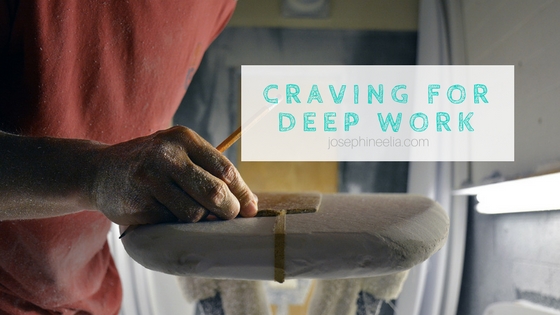There’s a satisfaction that comes from crossing off many items from a to-do list that each only requires 15 minutes or less. But there’s also a type of satisfaction that will never come from just crossing off 15-minute items.
The latter type of satisfaction is the one that you get after doing deep work, a work that takes long incubation and construction time, that squeezes your brain until it is fried, that produces something big, whose process seems like childbirth.
Often, the adult life is filled with scattered type activities. Chores, bills, errands. They are short-term activities that never end. It takes a different kind of endurance to do these activities.
But even in artistic endeavors, with the pressure to be visible and noticed throughout social media these days, tend to be quick work at the expense of depth.
Yet, it’s still so satisfying when you read a lengthy investigative journalistic piece, or listen to a story that you know have been crafted for a very long time, with much thought and intention, research and revisions. These are examples of deep work, a type of work that chisels a piece of your soul and you’ll never be the same again as a result of producing it.
Quantity Produces Quality
I tend to believe in a proportionality rule. Things that develop over time don’t disappear over time. Things that get done quickly tend to get forgotten quickly too. And it’s not just the total amount of time required to complete the work, it’s also the amount of time put in for any given work session. There are thoughts you will never get to unless you spend two, three, four contiguous hours thinking about the work.
Which is a problem in today’s distracted world. There are a plethora of things that demand our micro-attention constantly, and it takes immense discipline to switch off and focus about one thing for a long time. The trade is this: what is the opportunity cost of being distracted? It’s that valuable work that would otherwise be produced if we were not distracted.
I remember the first time I transitioned into an 8-hour work day schedule. At first, it was so boring to sit in one place for 8 hours, waiting for that 5 o’clock to come. To pass the time, I checked Facebook, browsed the world wide web, switching between work and distractions to help pass the time, or so I thought.
But then I tried another experiment, which was to block off all distractions for that 8-hour time period and just work. Incredibly, by doing this, I was able to get into another level of focus that made work even more interesting. I got into the zone. More questions emerged. The brain was working, plugged into another gear, and time ceased to be felt. The 8-hour passed by so much quicker, and none of it was boring.
Getting Over the Dip
To get to a state of flow in deep work takes some initiation effort. There’s a dip that we all have to get over–where most people abandon their efforts–to get to the other side. It’s not easy, and sometimes laziness prevails. But past this threshold, there’s something valuable, a combination of our own creativity and individuality, a contribution that only we can make.
The labor of producing something good will be painful in some degree. But it’s always worth it.
—
A book that I want to read on the subject of deep work is Cal Newport’s Deep Work: Rules for Focused Success in a Distracted World.




Thanks, Nick! All the best in your own deep work.
Excellent read! I especially like your point about quantity producing quality – the more you do something, the better it becomes! It’s hard to remain focused on one thing, especially in today’s world with all the possible distractions. But like you said, it’s always worth it.
Really good article. Good advice and very well-written. Keep it up!